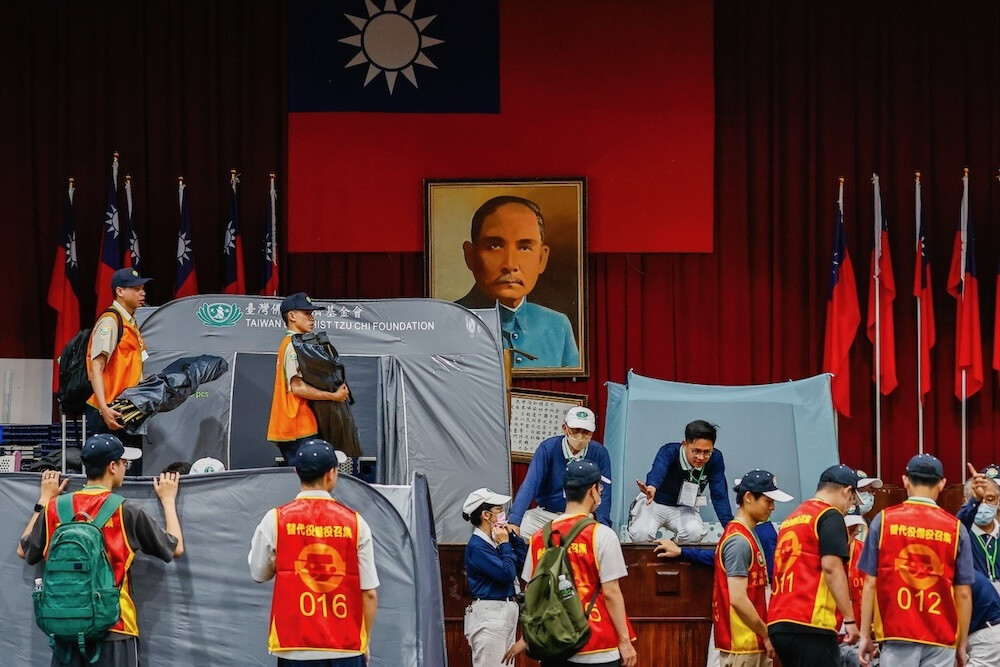
Taipei – On March 27th, international human rights organization ARTICLE 19 directly observed Taiwan's latest nationwide disaster preparedness drill. This exercise holds significant importance as the first civil defense drill conducted under the auspices of the newly established 'All-Society Defense Resilience Committee.' Simulating large-scale natural disasters such as tsunamis or organized attacks on critical information infrastructure, the drill demonstrated Taiwan's commitment to recognizing national security as a comprehensive concept extending beyond military readiness and emphasizing the participation of civil society. Notably, the involvement of the central and local governments, civil society organizations, religious groups, and voluntary community networks signifies a crucial step towards a new model of crisis response grounded in national capabilities as well as transparency, civic engagement, and shared responsibility.
Taiwan's efforts to enhance nationwide resilience are becoming increasingly crucial amidst heightened regional tensions, following large-scale joint military exercises conducted by the Chinese People's Liberation Army around Taiwan in early April. In a statement, ARTICLE 19 emphasized that "a resilient democracy must go beyond mere physical protection to include ensuring the integrity of information," stressing the importance of comprehensive access to reliable information and the protection of freedom of expression, both during and after a crisis.
In this context, ARTICLE 19 urged the Taiwanese government to consider the following policy recommendations to further strengthen nationwide resilience:
Protecting Information Infrastructure as a National Priority: Safeguarding information infrastructure, both physical and digital, is a core task of national security. Taiwan's data centers, submarine cables, broadcasting stations, and telecommunications networks are essential for emergency response and seamless communication among citizens. Therefore, robust physical security and resilience against natural disasters, intentional attacks, and other potential threats must be ensured. Continuous development of backup communication systems and alternative energy sources is necessary to maintain critical information infrastructure even in the event of power outages or cyberattacks.
Ensuring Access to Reliable Information During Crises: Timely and multilingual emergency disaster alerts (such as the SMS text messages sent during the March 27th drill) must be accessible to all citizens, especially marginalized groups. Citizens should have access to alternative means of obtaining reliable information, including guidance on how to find trustworthy news through FM radio or local bulletin boards when smartphones are inoperable or internet access is disrupted, locations for device charging, and places where direct information updates and support can be obtained.
Strengthening Proactive Strategic Communication Capabilities: The Taiwanese government must strengthen its strategic communication capabilities well before a crisis occurs. If government messaging is delayed or unclear, the information space becomes more vulnerable to disinformation and propaganda. At the same time, communication during a crisis must not be used as a tool for censorship. Responses to disinformation must fully respect human rights principles, with transparent procedures ensuring the oversight and accountability of the media, civil society organizations, and the general public. Taiwan's already active civic tech community and fact-checking innovations can serve as a good model for other countries.
Conducting Regular Audits of Public Messaging: The utilization rate of existing disaster-related digital platforms (e.g., health passport apps, fire service apps) is low. ARTICLE 19 recommends reassessing and redesigning the usability, visibility, and public trust in these tools. Citizen participation should be encouraged through user-friendly interface improvements, proactive promotion, and enhanced personal data protection.
Strengthening Cooperation with Civil Society and the Private Sector: The participation of civil society organizations and the private sector in the disaster preparedness planning process should be expanded. Clear channels for verification, coordination, and communication with civil society organizations, particularly during crisis situations, should be developed. These organizations are often the first responders in emergencies and enjoy high levels of trust within communities. Similarly, technology companies such as Meta and Google play a crucial role in shaping public discourse through content moderation and other means. The Taiwanese government should collaborate with these companies to increase the transparency of crisis response protocols, content moderation policies, and contingency plans. ARTICLE 19 urges the integration of these companies into national resilience plans in a concrete and accountable manner, while emphasizing that cooperation with the private sector, especially in addressing disinformation, must strictly adhere to international standards of freedom of expression and the principles of legality, legitimacy, necessity, and proportionality.
In conclusion, resilience extends beyond simply bolstering military defenses. Ensuring that citizens can communicate, access information, and participate in public discourse even in the most challenging times is paramount. Taiwan's future should move towards placing the right to information and coordinated, rights-based communication plans at the heart of its national security strategy.
[Copyright (c) Global Economic Times. All Rights Reserved.]






























